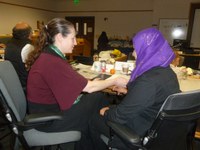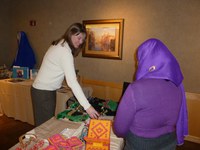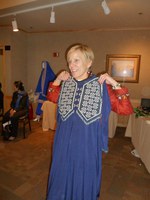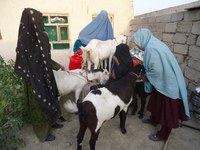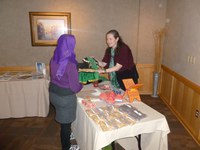NDSU Professor Mentors Afghanistan Woman
(Click an image below to view a high-resolution image that can be downloaded)
Mentoring and advising agribusiness students is not unusual for Cheryl Wachenheim, a professor in North Dakota State University’s Agribusiness and Applied Economics Department.
However, it is new territory for her to mentor someone who lives thousands of miles away.
Wachenheim also is a major in the Minnesota National Guard and was deployed to Afghanistan, where she was a member of the Guard’s Agribusiness Development Team. The team’s mission was improving the Afghan government’s ability to provide for its people and promote economic growth.
Her responsibilities included mentoring women to help them develop or expand businesses. She mentored one woman in particular, Zuhra, on her agricultural enterprises (We are not using Zuhra’s last name to protect her identity.). Wachenheim saw great potential for Zuhra and encouraged her to apply for Project Artemis. Together, in a conservative province in southeastern Afghanistan, they worked on Zuhra’s application.
Project Artemis is a two-week business education program in Glendale, Ariz., that helps build the entrepreneurial skills of promising Afghan businesswomen. Mentors assigned to each participant provide additional support as the women return home to establish or expand their companies.
Zuhra was accepted into the program and Wachenheim became her mentor. Zuhra has completed her training in Arizona, but she will be working with Wachenheim for at least two years through calls, emails or online.
“I was pretty excited about Zuhra coming to the U.S. because the last time I saw her, I had on 70 pounds of body armor and other gear, plus I was carrying two weapons,” Wachenheim says. “She taught me a lot while I was in Afghanistan, but when she came to the U.S., I was able to show her what it is like to be truly free. She went through the classes but also did some cultural activities, such as bowling, which was truly amazing.”
“We learned about marketing, finance, management and leadership and then about how we are the center of these in our business,” Zuhra says. “More so than anything, we learned about hope and to forgive ourselves if we make mistakes along the way. We also learned that we are not alone.”
Zuhra says her biggest problem was pricing her products that she sells in Afghanistan, which are beaded items that have been sewn on to purses, clothing and other goods. However, her larger goal is to expand her involvement in agriculture, such as through producing yogurt from goat’s milk.
“We learned about different strategies, and Ms. Cheryl liked my ideas of surveying customers about quality and prices for my products,” Zuhra says. “It was fun because we practiced the survey with her being a customer.”
Zuhra plans to sell her products in Kabul, where there is more freedom for women. However, she has concerns about safety, so she wasn’t in the photo of the Project Artemis graduating class and hasn’t allowed anyone to take frontal photos of her.
“We are always afraid there will be more problems for women, but Ms. Cheryl says I can’t take care of this, so I should focus on improving and growing my business and be ready to respond if the Taliban make it hard to do my business,” Zuhra says.
Wachenheim says there still are many things she would like to show and teach Zuhra.
“I hope I can do this in the coming years as we communicate by telephone and email,” Wachenheim says. “The challenges with inconsistent or not available Internet and that we speak different languages will make mentoring interesting, but we can do this. I have such hope for her. She has so much passion for her work and, through it, for the women of Afghanistan.”
Wachenheim also says she has received a great deal of encouragement and help from NDSU and colleagues to continue her work with Zuhra.
While stationed in Afghanistan, Wachenheim was able to contact various colleagues at NDSU to seek help with any sort of agricultural problem she or the team encountered.
“Everyone at NDSU has been so helpful in providing solutions.” Wachenheim says.
NDSU Agriculture Communication - Feb. 26, 2013
| Source: | Cheryl Wachenheim, (701) 231-7452, cheryl.wachenheim@ndsu.edu |
|---|---|
| Editor: | Rich Mattern, (701) 231-6136, richard.mattern@ndsu.edu |

